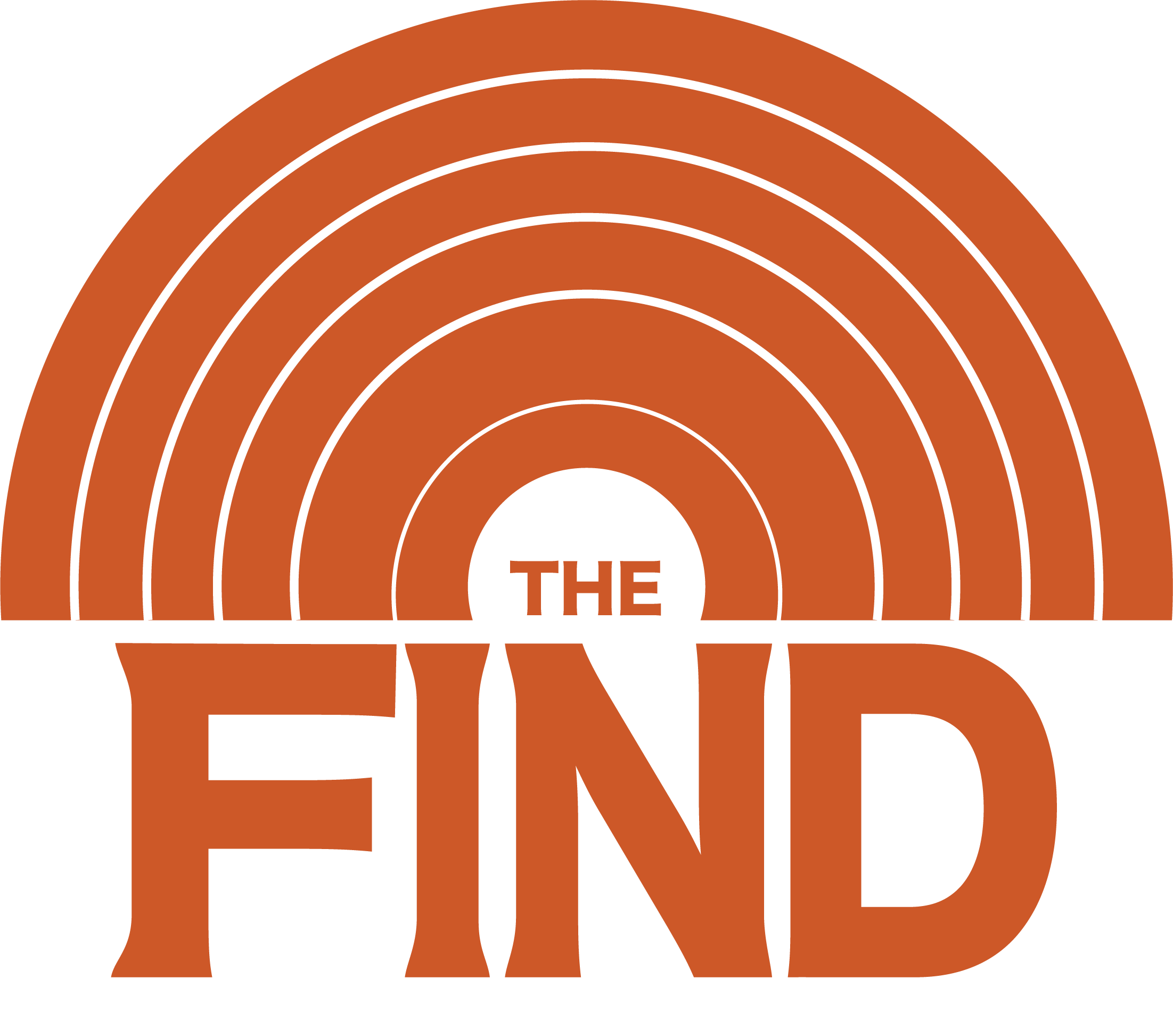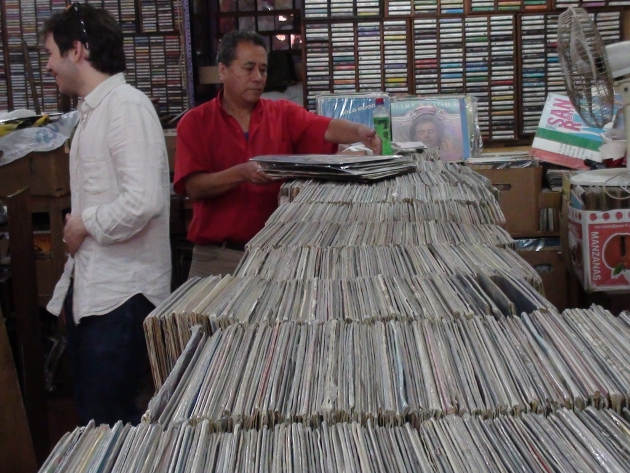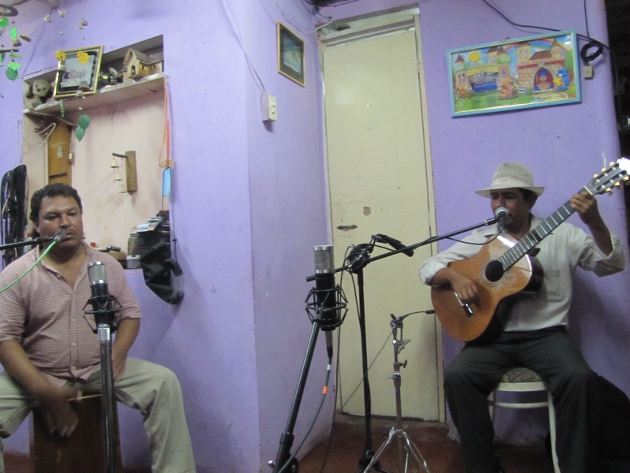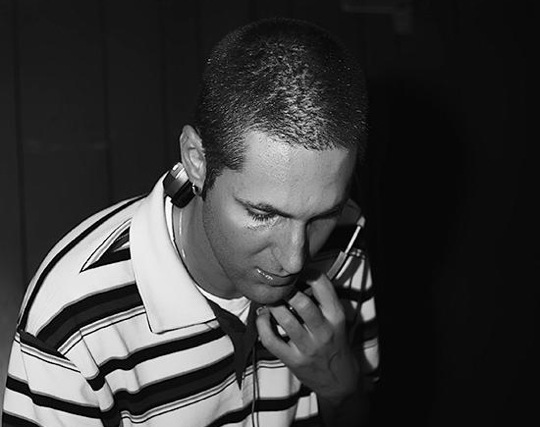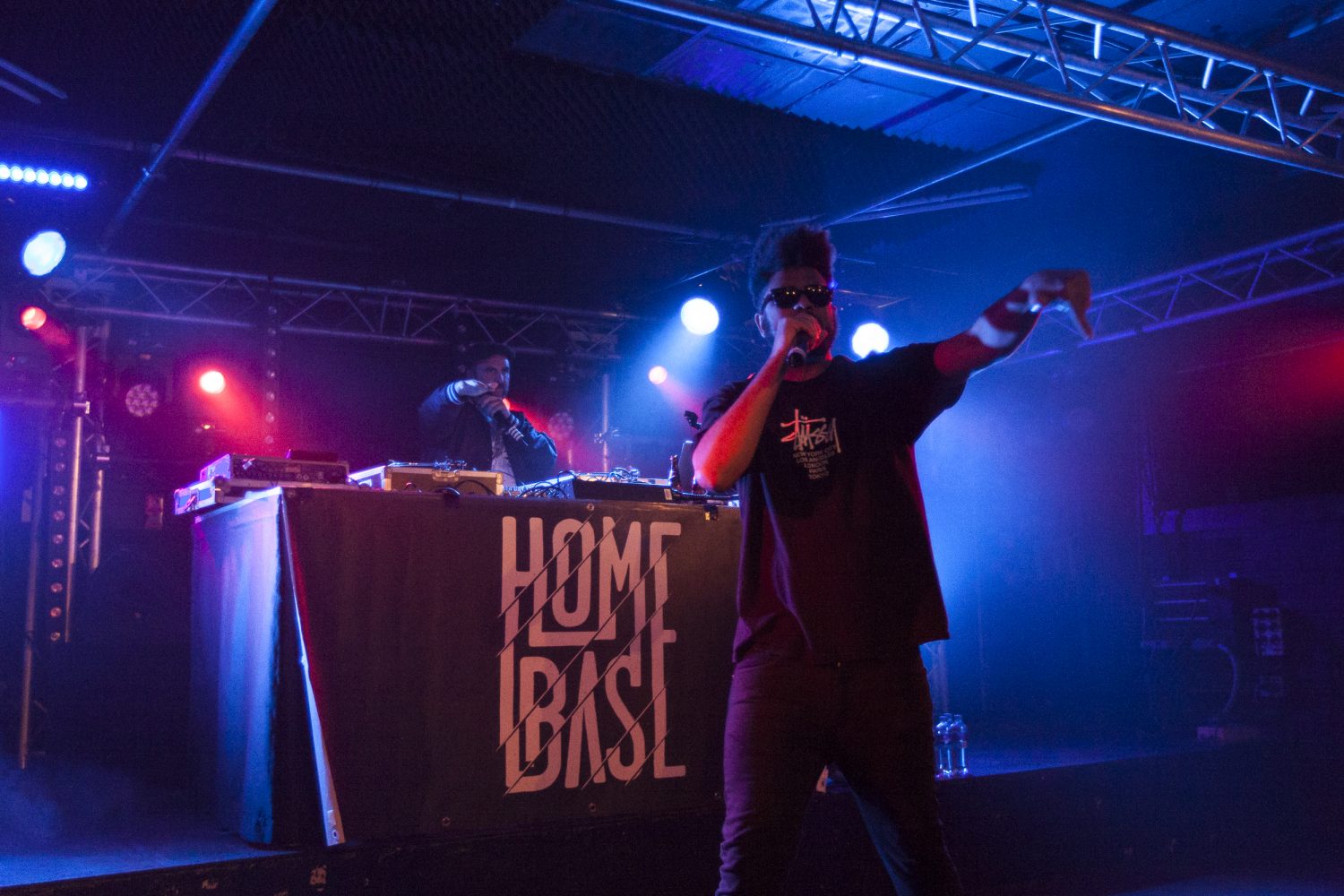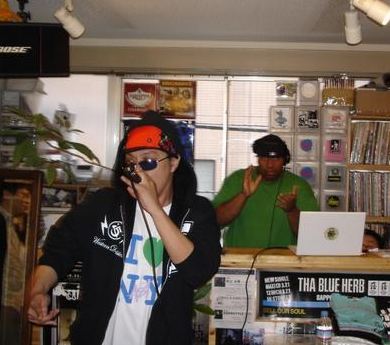Interview: Secret Stash Records
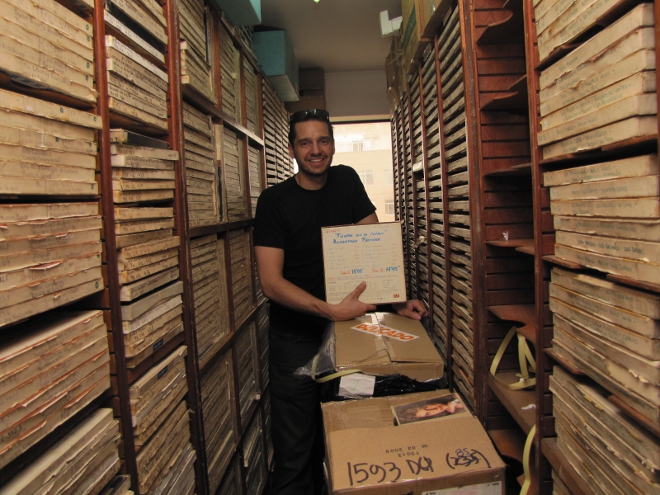
A while ago I got a chance to chat with Eric Foss from Secret Stash Records, a really great growing label from Minnesota. We talked about everything from their goals with the label to their trip to Peru in search of music to some of the best and worst music they’ve been shown by fans.
These guys have been releasing an amazing catalogue of rare and forgotten music on vinyl for the past few years and will only continue to impress. So check out the interview to get familiar and check out the mix of Peruvian selections from their releases featured on Laid Back Radio!
What is Secret Stash and how did it all start?
We’re a vinyl only label, that focuses almost exclusively on reissues. It started in 2009 with my partner Cory and I, we had started another label called Innovative Multimedia, which was like budget recordings and stuff that we would manufacture and sell to Wal-Mart, Borders Book Store and things like that. Before that I had been in the industry for 5 or 6 years, running different labels for people, consulting other labels on marketing and distribution, and with all of that, I wasn’t really satisfied. I was selling a lot of music I didn’t care about, it really became just about business rather than music. I wasn’t satisfied when I went home at the end of the day. And then we started Innovative Multimedia and I kinda started feeling the same way again, that I wasn’t involved in something I was passionate about. We would record Polka records and sell for Oktoberfest CDs at Borders and stuff. Y’know it was an okay way to make some money and it beats the crap out of getting an accounting job somewhere or something, but it still wasn’t satisfying the way Secret Stash has been. So after a year of Innovative Multimedia, we launched Secret Stash and just focused on reissuing other stuff.
What do you look for in music to reissue?
Well that’s a great question, and there are many facets to it. We can’t just come at it from one angle. A lot of labels will just say, if I like I’m gonna put it out. We want it to very much be a reflection of our taste, but we’re really also interested in feeding a need that exists within our customer. We really see our label as a label that interacts more with our customers than the average label. If we are hearing a demand for something from our fanbase, then we’re gonna try to respond to that by bringing a product to market that meets demand. So we really try to involve the vinyl community and fans of the label in what we’re doing. That’s why once a month we’ll host an assembly party where you can come into our office, we’ll give you some free local beer and pizza and then you help us assemble a record. You’ve become a part of the process of making one of our albums you know what I mean?
We’ll post on Facebook once or twice a month, ‘hey what shops are you buying our records from or what shops would you like to see our records in?’ Or we’ll just start asking people in emails and stuff ‘what country do you think we should be looking at?’. We very much want Secret Stash to be not just about the 3 of us that run the label, but really about a community.
We’re very well branded, you’re not gonna see us put out country and folk, you’re not gonna see us put out hard rock or psych records, everything basically needs to be groove based. The idea is that we want to dig up something that fell into obscurity, something that for some reason was forgotten about and didn’t get a fair shake, we want to give it a fair shake now.
What’s the process you have to go through in reissuing a record?
Okay that’s also a very good question. The first thing to keep in mind is that the only records that you see are the ones we were able to complete the process on. We have dozens if not hundreds of records that we want to be reissuing, but if we cant get every step of the process in place, that record will never be reissued… not by us at least. So obviously it starts by listening and enjoying certain music, and then and once that happens, feeling out what is happening in the scene, is there an interest in this right now or are you bringing something totally new and different to the table. Either one of those can be okay, we did Persian Funk and it was a great seller for us, there’s not a huge demand in the market specifically for Iranian funk rock and soul, but there is enough interest in world grooves that we knew we could put together a solid comp and have success with it, and again that the people that are a part of a community could appreciate it.
So then it gets to the really hard part. Those are the easy parts. Then it gets to tracking down the owners of the music, we don’t do anything that’s not properly licenced, everyone has to be paid, and it has to be done legally. There are a lot of labels that don’t abide by that, or they bend those rules, we don’t do that. So that’s where 99% of projects get stuck in the mud right there. Then its an issue of tracking down the master tapes. You might find someone who owns something but they don’t have masters, if you cant find a solid master to work from you wont really have a release, so those are the issues where it gets really tricky. Basically find something you like, make sure it will meet a demand from your customer, track down the copyright holder, getting into the specifics of that is crazy ’cause it can be done a million and one different ways, there’s no silver bullet solution for it, and then the same thing with masters, do they have masters or don’t they have masters,
Do you do the remastering yourself?
Yeah, actually my partner Cory runs a studio over in st. Paul and he is a very, very talented engineer and he has done all the remastering of all of our records.
Why vinyl records?
I can give you the obvious reasons that your readers are going to expect, I can tell you that it sounds better, I can tell you about the warmth of analog technology, about holding the package in the palms of your hand and reading the liner notes. I could tell you about the connection to a physical product, and all those things are true and I believe in them, but I also see a lot more to it than that.
If you were to go to a record store here in the US, a good record store in the last couple of years, maybe it’s Amoeba or whoever, the record store in our town that’s the big indie is called Electric Fetus. If you go to Electric Fetus, the room is split right down the middle, on one side are all the CDs, and on the other side are all the vinyl. If you stand right in the middle of that room and you watch the way people shop for CDs and then you watch the way people shop for vinyl, it’s drastically different.
A CD consumer is gonna walk in and say ‘I want the new Sharon Jones and The Dap Kings CD’, they’re gonna walk in, go to the Sharon Jones bin, grab the CD, go to the cashier and that’s pretty much it, they might walk through on their way out and maybe say ‘you know I also want this John Coltrane CD’, but you’re gonna see them head to the bins for a certain thing. Then turn around, and look at the way people shop for vinyl, and they DIG through the bins, you’ll see people flip through every fucking record in those bins, thousands of them. They’ll be there for hours just flipping through. You don’t really see so much of that the way that people consume CDs.
The products we’re interested in releasing, and sharing with people is not the type of music where someone is going to come into a store and go ‘you know what I want today? A Persian funk CD’ and like go try and find it. They’re going to walk in and start flipping through the bins and stumble over it and go ‘wow this looks cool as hell I think I’ll give it a shot.’ So that’s very important to our strategy.
Additionally, it sort of has the potential to come off as elitist. People go ‘oh you only do vinyl, blah blah blah.’ it sounds almost little elitist, well I’d prefer not to see it that way. You know I was talking about the way in which we value our customer in that we consider it a community. There is a certain, for lack of a better term, exclusivity to it, that our customers are like part of a little club, and not everyone can get into that club. If you don’t spin vinyl, you’re probably not going to buy Persian Funk, and yeah we throw in a download card cause were cognizant of the fact that people want to put to stuff on their iPods and they’re gonna rip it anyways, so we’ll just make it easier for them. You’re probably not gonna buy our records if you don’t have a turntable, and it adds something very special to the relationship that we have with our customer. It’s a little bit like a club, and you know what? Not everybody can get into it, what’s the point of a club if everybody can get into it… it doesn’t really make sense you know what I mean? That’s kinda how we see it.
So what made you want to come to Peru in the first place?
Cory had a guitar teacher here in St. Paul named Andres Prado, who is from Lima, and as far as jazz musicians go he is fairly prominent down there. He had taught Cory about Afro-Peruvian music, and then Cory showed it to me, and we were like ‘okay, this is pretty amazing and there really aren’t a lot of labels doing anything with it, what do we do?’ We considered putting together an ensemble up here and putting together some stuff. Then we realized if we were going to do anything with it, we really needed to go down there. So when we went down there, our intent was to record Afro-Peruvian music for the Peña record we put out. We went down there for 7 days, and we recorded 50 tracks in 7 days, and subsequently have released 3 volumes of Peña, an 18 track CD, a 17 track download album, and a 7 track remix download album. We shot a documentary of the whole thing as well, its short, its like a 35 minute documentary. So that was really our plan going down there, but once we were down there, we have a passion for rare old music, and we decided to do some digging to see what else we could find and sink our teeth into.
Is there anything that stands out about Peruvian music compared to other countries?
Well it’s a pretty broad question, and I guess this is a part of it… there is so much different music from Peru, whether it be music from the highlands, jungle or the coast, and then all the music from the 60s with the bands that were trying to play European and American music, you know like Los Belkings and stuff like that… beat music they were calling it. So I think that is part of what is so interesting. From a lot of the people I’ve spoken to, Peruvians, and musicians I’ve recorded with, they sort of see Peru as like 3 separate countries in a sense, the coast, the mountains, and the jungle. You don’t see so much of that from other South America countries, where it’s like they have so many drastically different styles of music.
The cool thing is a lot of those styles can be traced back to similar roots. I don’t hear as much of the Andean influence in Afro Peruvian music, but a lot of people swear that it’s in there. I hear the Spanish guitar and the African rhythms more than anything, but there’s alot of people that say that Andean stuff is still very important to it on some level. I think the older Afro-Peruvian music, with fiddles and stuff, that was very Andean tonally. Similarly with the jungle music, the cumbia, or as some people like to call it Chicha, you can hear all of it in there. It comes from Colombia which already has a very strong inherent African influence. Enrique Delgado (Los Destellos) was a Criollo guitar player so he had those sort of chops, and some of the other bands would take it and add a lot of the Andean influence to it. It’s crazy the way you guys have 3 different specific regions that have 3 very different styles of music, but when you get down to it, a lot of it can be traced back to the same roots of the country.
Do you have any crazy stories from Peru?
Oh man tons! We were at the IEMPSA Records headquarters, and then we went down the street to Xendra Records, which is their sister label and we spent some time looking through their master tapes, which was very cool. I don’t speak any spanish, so our friend who came along as an interpreter, Unai, I asked him to tell them I wanted to go find some used records. The sales guy, Cesar, started laughing, he was like ‘yeah I know a place but you can’t go there’ and everyone in the office started giggling and we’re like ‘well why?’ And he said ‘well look at you, you have 2 HD cameras and a laptop computer hanging off your shoulders’. We were like ‘I don’t get it’. Hes told us it was in a pretty rough part of town, and we wouldn’t make it out of there with our equipment if we brought it. I told Unai, ‘I don’t care man, tell him I want to go’. So he finally said ‘look I’ll take you on two conditions, the first is that you leave all that shit here, and the second is that you promise not to go back without me.’ So he paid for our bus fare and we hopped on a bus and went in to central Lima and yea it was really fun. He had known Dante (main record shop owner) for 35 years or something, so we walked in and went straight to the back and up those stairs. He basically said this is the guy you need to talk to, and he and Dante guided us through the bins for 3 or 4 hours.
We also met some street musicians, a couple guys named Larry and Alberto that play near the Chabuca Granda statue in Barranco. I think ’cause its kind of a tourist location they are able to get the tourists to cough up a little money. We met them and told them what we were doing in Peru and we were impressed with their playing and thought it would be fun to do some recording with them. They said ‘oh yeah just meet us back here tomorrow at noon.’ So we came back expecting they were gonna have some place set up for us to record and they say ‘yeah just come back to my house’. You know we are carrying no less than probably $20,000 worth of recording and video production equipment, so we walk for must have been about 3/4 of a mile lugging all this equipment. And it was one of these really tiny alleys with houses side by side, and a gate into the alley. We walk up to it, and Corey turns around and looks at me and he’s like ‘are you fucking kidding me? There’s only one way out and its the way were going in and we have thousands and thousands of dollars worth of equipment.’ And I don’t know I just said ‘I don’t know these guys seem pretty legit, this might be one of those things you end up saying oh it seemed like a good idea at the time.’ But they treated us like family man, they brought us into their house, it was so humbling, their entire house could probably fit in my living room, just like a tiny, tiny little place, sheet rock is falling from the ceilings, one light in the whole place.
We were very fortunate to see the reality of, not necessarily the whole country, obviously the country isn’t impoverished, but we got to hang with some real musicians that have dedicated their lives to Afro- Peruvian music. It’s in their family, these guys didn’t read any music, they said they learned this from their parents. In fact the father of one of the guys came to the session and was playing along and stuff. We were really fortunate to be able to experience that in a very real way. Rather than if we went down there and found a recording studio to rent out for a week and just started bringing people into the studio. We got to go in the guys house and see where he lives and how he lives, and he sang for us in his living room and we recorded it! When you listen to those recordings there is a very real and raw energy that I’m convinced wouldn’t be there if we had set up it in a nice recording studio. We may have ended up with a more commercially palatable album if we had done it that way, but it would be lacking that very raw and real energy. Not to mention our exposure to Afro-Peruvian music in general probably would have been vastly different.
So you guys definitely like grooves and what not. For you how does jazz funk and soul from the 60s and 70s compare to that of today?
Unfortunately I think with most of the successful stuff from today, a great example is the Daptones stuff… it’s really hip. I heard an interview with Gabe from the label, and he was just like, ‘look we’re not innovators, were just trying to recreate a sound’. So even the stuff that is working really well, they’re just basically trying to copy a sound that already existed. The Daptones specifically, I would say it’s pretty innovative what they did, they were like ‘hey we’re gonna reach back and totally commit ourselves to recreating the sound, the look, the feel, the texture, everything about 60s soul music, and I think that’s cool, but musically it’s not innovative.
I have a tough time with some modern jazz, I do listen to some Pat Metheny from time to time, but for my money you still can’t beat a 1960s Miles Davis or John Coltrane record. I love Cannonball Adderly and nobody touches him nowadays, a lot of people just find success by copying that and doing it again.
So as far as a lot of that stuff goes, there’s not a lot of innovation happening. I think there was a really cool neo soul movement for a while that was creative, stuff like D’Angelo… a couple records he made were fantastic, I loved those records, absolutely loved them. I think that was a really cool progression and innovative twist, but the stuff that is working right now is people just copying old sound. Which is cool! I enjoy it as much as everyone else, but its not innovative you know what I mean?
I’ve heard people direct towards to rare unheard music and stuff all the time right? So can you comment on some of the best and worst stuff you’ve heard?
Hah we’ve heard some pretty shitty stuff, but it’s so cool that people want to share! We’ll just get random emails from people through the website with attached mp3s. It’s not like stuff that they own, its not like ‘hey here is my band check it out’. But maybe the worst one was some Pakistani thing, and it was like Pakistani pop music from the 70s, and it sounded like whales raping each other, it was terrible man aahhh. Some good stuff though…. Africa! People are always sending us cool African shit, like all the time. So that’s probably where we’ve heard the most really cool stuff. In fact, here is a really good example, the limited edition 7” that we are releasing with the Vis a Vis LP, that was introduced to us by a fan of the label, he hit us up saying we should check out this rare single, and we come to find out it’s a super super rare 45. I’ve heard people say they think there are maybe a dozen left on the face of the planet. I wouldn’t really know how to confirm or disconfirm that, but I can tell you we had a hell of a time tracing down copies of it to get all the info.
Are you aware of certain claims that some of your releases are fake?
Yeah I’ve heard that about some of the older stuff, and I guess… all I can say is what I know about our licensing sources. If you’ll notice, you don’t really hear those claims anymore about the newer stuff because we’ve moved on to some different licensing sources. I guess that’s about as much as I can say about it. I know who I paid and what they told me they had. I saw their tapes and did that sort of stuff, but that’s about as much as I can say about it definitively.
You know the internet has a way to let people really focus on negativity and it sort of feeds itself and people will just jump to conclusions, often unfairly. It got to the point where we put out The Rhythms of Black Peru and I read on a blog; ‘oh man I can’t believe they are bootlegging this stuff’, or someone saying this Peruvian Funk record is totally fake. And I’m like what the fuck are you talking about? I bought those LPs in Lima, you know what I mean? It has this way of feeding itself into all this negativity.
So yeah I know the records you are talking about, actually there is a guy who used to at the label that set up those first few releases, we don’t work with him anymore, but I met his sources man and I can just tell you that from the people I met and the tapes I saw, I didn’t see anything fake you know what I mean? The other thing I can say is that they are great records. So I know it’s not the most definitive answer. Some people, a very small group of people, are just taking opinions and in their minds turning them into facts. I’m just gonna stick with the fact that I know, cause that’s the right thing to do. I saw the tapes, I talked to these people and I know who we licensed them from you know what I mean?
